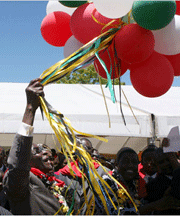
TAIPEI, Taiwan — A Zimbabwean student here says his country can “rise from the ashes” and “be the power house it was” if President Robert Mugabe demits office.
Paddington Dube, an international business major at Ming Chuan University International College, told I Witness-News that Zimbabweans are being oppressed.
“It is oppression that is going on in Zimbabwe and the use of force — like scare tactics — so that people obey whatever (Mugabe) says,” Dube said.
“It is really a terrible situation,” said Dube, 23, who moved to Malawi to live with relatives when his mother died five years ago.
“I think Mugabe being there is just stopping everything, like whatever foreign help we can get … In (Mugabe’s) head, Zimbabwe is his; it’s like his property. So I am hoping that things can get back to normal and Zimbabwe can be the power house it was,” Dube said.
Mugabe, who turned 85 in February, was instrumental in ending white rule in the then Rhodesia (now Zimbabwe) and has led the country since independence in 1980.
The country slipped into political turmoil last year after Mugabe’s Zanu-PF party lost the first round of the presidential election in March 2008, but won the run-off in June.
The opposition leader Morgan Tsvangirai of the Movement for Democratic Change, the only challenger, did not contest the run off.
Tsvangirai had said that the elections could not be free and fair because of political attacks on his supporters.
After several rounds of negotiations, a power-sharing deal was reached in January, in which Mugabe remains president, with Tsvangirai as prime minister.

The country’s economy began collapsing after Mugabe began seizing white-owned farms in 2000 and many foreign investors left the country.
The nation’s GDP has fallen by 50% and the poverty line increased by 82%, the Mail & Guardian Online reported.
Dube said that if Mugabe had demitted office, the president would have been “a hero for a lot of people”.
“… A lot of people are going to hate him for that, even people who are close to him,” Dube said.
He said that many people in Zimbabwe cannot afford to buy food. And many of those who have money cannot find food.
“Right now when I talk to people at home, it is really crazy. I think it’s by God’s grace a lot of people are surviving.”
“…When you walk into a shop, there is nothing on the shelf. You want to buy something, there is no money to buy those things, and most of the time, if you have that money, it is worthless.”
Zimbabwe has the world’s highest inflation, which some economists had put at 10 sextillion (1021) per cent, the BBC reported in February.
The country faces food shortages and a cholera epidemic which the World Health Organisation says has killed 3,894 people since last August.
Dube said that his family is fortunate enough to have relatives overseas who repatriate money to those still in Zimbabwe.
“For the most part, they say, they are getting by, but things are tough. (They) can’t even get on a bus to get into town to do shopping, or sometimes (they) have to go two days, eat one meal,” he says of his relatives in Zimbabwe.
Mugabe supporters raised US$250,000 for a birthday party last week, days after Zimbabwe asked African states for US$2bn in economic aid, the BBC reported.
A BBC report said Prime Minister Tsvangirai told a meeting of officials in neighbouring South Africa last week that the cost of rebuilding his country’s economy could run as high as US$5 bn.
“It is pretty sad because Zimbabwe was a really beautiful place to be; but now a lot of people are complaining,” Dube said.
He says that he is concerned about the well-being of his relatives because of the outbreak of diseases in Zimbabwe.
“With everything going down and a lot of diseases coming around, you get scared that one day you might just hear that one of your family members has died or something like that.
“But for the most part, they are surviving…. (They) adapt to whatever is coming at them at that moment. Right now, I think I can safely say everybody is doing okay — okay in quotes. But it is tough. It is pretty tough.”
Dube still considers Zimbabwe his home, and would like to go back and enjoy the type of life that he did in his youth.
“I wouldn’t want to go back to such a situation right now. I think it would depress me and it would hurt me a lot to know that I can’t do anything about it…. I could go there and I never know what could happen,” he says.
Dube believes that other Zimbabweans in the diaspora feel the same way about the situation.
“I think we are in the same boat. Because a lot of people, they want to do a lot of things for people back home but because of the situation… they can’t do a lot.”

Dube said that it is a custom in Zimbabwe to return home for certain celebrations such as Christmas, and he believes that many Zimbabweans long to do so.
“But now, people have to stay where they are because they don’t know if they go back home if they are ever going to go back to whatever they were doing wherever they were,” he said.
He said that many Zimbabweans are loyal to Mugabe because they fought along with him during the liberation struggle, while others are just afraid of him.
“Mugabe is in a situation where he can do anything … So he has a lot of control over the people. It is a combination of all of those things, some are just scared, some are just coaxed by money and some are just loyal to Mugabe.”
Dube is hopeful that things will change by the time he graduates in 2011.
“With the base I have established here in Taiwan, the language base and understanding what’s going on around me, I think I’d love to bring back that glory we had before, and use whatever skills I have acquired here to improve whatever it is in Zimbabwe that needs improving if given the chance,” he said.





